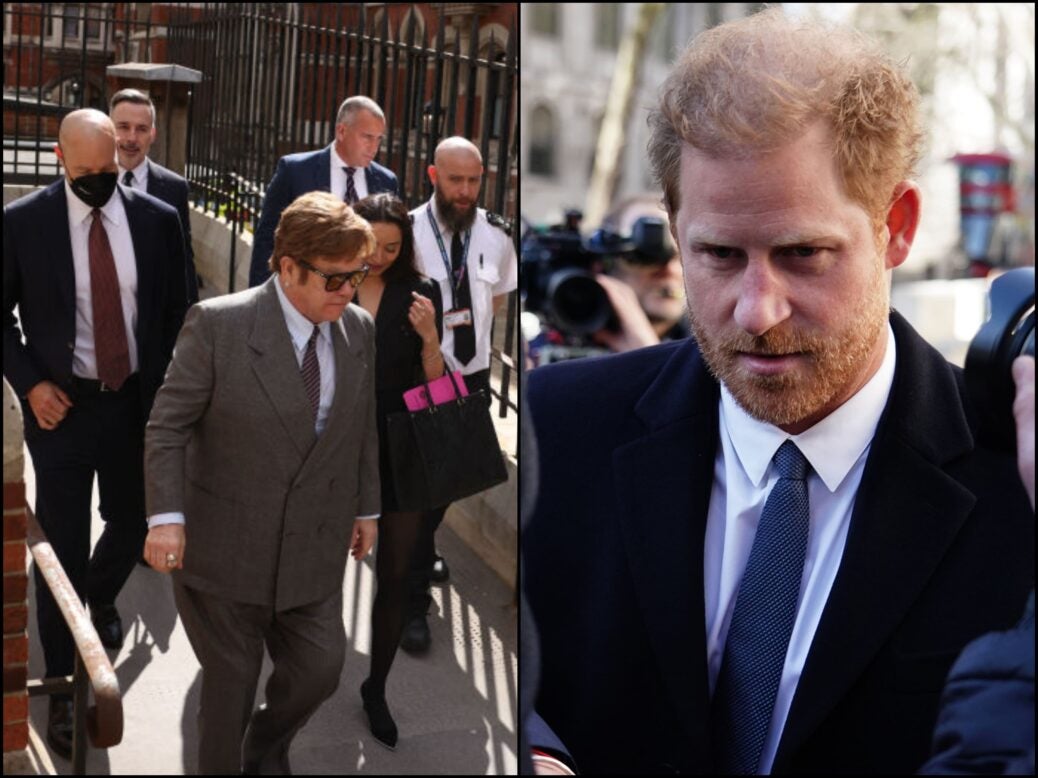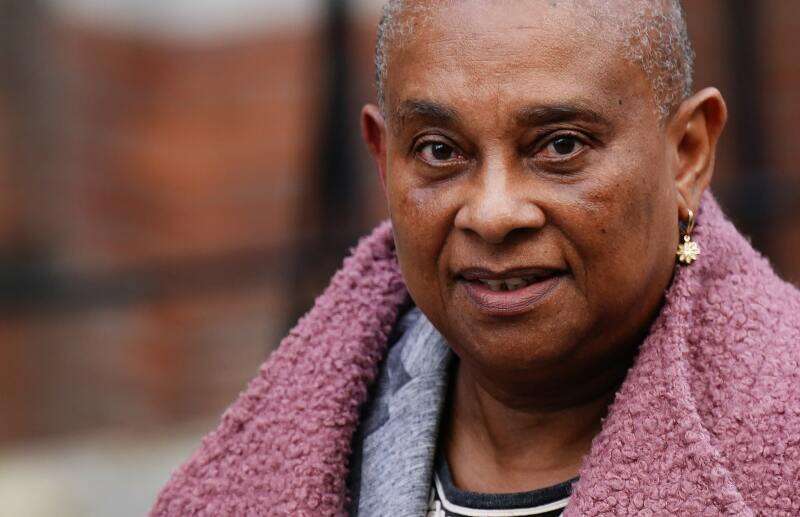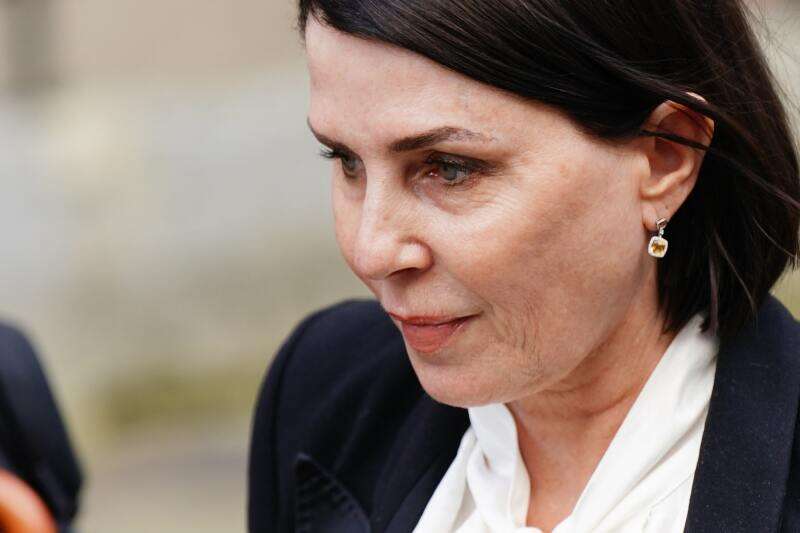
A High Court judge has allowed the temporary ban on reporting the names of 73 current and former Daily Mail and Mail on Sunday journalists mentioned in the legal action over alleged criminal invasions of privacy brought by Prince Harry and six other high-profile litigants.
Associated Newspapers, which is being sued by Sir Elton John, his husband David Furnish and the Mail’s former ally Baroness Doreen Lawrence among others, argued that it would be unfair to disparage the reputations of journalists over historic allegations at this pre-trial stage before it is able to put forward a defence.
The publisher has also argued that the claims are “stale” because they have been brought too late and that they use information that was put under a restriction order in the Leveson inquiry.
It has therefore asked for the claims to be dismissed with a summary judgment and not proceed to trial. Nonetheless the Mail publisher has made clear it “firmly” denies the allegations against it.
Prince Harry was a surprise arrival for a hearing in the case at London’s High Court on Monday morning, with fellow claimants Sir Elton, Furnish, Lawrence and actress Sadie Frost all attending for at least part of the day. The media had believed Harry was at his home in California and would not be flying over for the hearing, which was not a trial but centred on Associated Newspapers’ attempts to have the action dismissed.
The allegations against the Daily Mail and Mail on Sunday in the case, which is also being brought by model Elizabeth Hurley and former Lib Dem MP Sir Simon Hughes, include: illegally intercepting voicemail messages, listening in to live landline calls, obtaining private information including itemised phone bills and medical records via deception or ‘blagging’, using private investigators to carry out these unlawful acts on their behalf and commissioning the breaking and entering into private property.
Associated Newspapers requested that 73 journalists named in the claims – some of whom now work at other publishers – should be anonymised until the judge decides whether the claims should be permitted to go ahead.
It said in written arguments that the conduct alleged in the case would constitute a “very serious attack on their honesty and integrity” and “strikes at the heart of their professional reputations as journalists and editorial executives”.
The only three individuals named who the publisher did not seek to anonymise were Paul Dacre, editor of the Daily Mail at the relevant times and now editor-in-chief, then-Mail on Sunday editor Peter Wright who is now editor emeritus, and group editorial legal director Liz Hartley.
The publisher added that there was a risk of a “frenzy of publicity” around the case due to the high-profile claimants which would “only increase the reputational harm and distress experienced by all these individual professionals”.
The publisher said it was “well aware” of the importance of open justice and that “it may be contended that, as journalists and media professionals, these individuals ought to have broad shoulders when it comes to court reporting of serious defamatory allegations about themselves” but said this was an “overly simplistic analysis”.
Mr Justice Nicklin agreed to make the order on Monday, saying it was “not usual for the court to impose reporting restrictions at such an early stage of proceedings” but that in this instance it was justified “in the interests of fairness and the administration of justice”.
The court heard that with the publisher yet to file a formal defence, there was not yet a full response to any “adverse comments” that might be made about the journalists. Mr Justice Nicklin said it would not be in the public interest “for one side of a series of allegations to be put when one side is absent”.
The judge also granted reporting restrictions over certain information in the court documents that Associated Newspapers alleges are being used in breach of orders made during the Leveson inquiry.
Mr Justice Nicklin said the temporary reporting restrictions would be revisited once he reaches a judgment over the preliminary issues being argued in court this week, in a hearing expected to last four days.
A legal team for the claimants, led by David Sherborne who has previously represented the “victims” of the media in the Leveson inquiry and numerous phone-hacking victims in court, said in written arguments that the allegations concerned acts alleged to have taken place between 1993 and 2011 and “even continuing beyond until 2018”.
However, the Mail publisher has argued that all seven of the claimants could have reasonably brought their claims at least six years earlier and that the case should therefore be dismissed with summary judgment.
Written arguments for the publisher, led by Adrian Beltrami KC and Jonathan Nash KC, said the claims were “stale” and the evidence given by the claimants did not prove they did not know enough about the allegations to bring them more than six years ago – or that they could not have discovered any such information “with reasonable diligence”.
They said “it would be surprising indeed for any reasonably informed member of the public, let alone a figure in the public eye, to have been unaware of these matters” following the Leveson inquiry and other high-profile hacking cases.
But, they argued, any allegations concerning behaviour before 6 October 2016, six years before the claims were issued, should be barred under the Limitation Act. All of the articles relating to the alleged behaviour were published more than six years before this point.
Sherborne and his team called this application “ambitious” and that the claimants did not discover the evidence until recently. He argued that the Mail’s application is “hopeless, plainly inappropriate and suggestive of a tactical gamble… to try to avoid (or at least delay) a full trial, when there are in any event clearly compelling reasons for one”.
The second application made by Associated Newspapers argues that the claims make extensive use of ledgers showing payments made to private investigators between 2005 and 2007 as disclosed to the Leveson inquiry in 2011. These ledgers, the publisher said, are “subject to binding disclosure and publication restriction orders and collateral undertakings as to their use”, putting the claimants in breach.
However Sherborne, who gave undertakings around certain material as counsel for the core participant victims at the inquiry, said the matters set out in the claim are “not the subject of any orders made at the Leveson inquiry, nor are they otherwise subject to any confidentiality orders or obligations” and that the restriction orders that were made “simply do not cover” the ledgers.
He also pointed out that the same material was used as the basis of several articles by a media outlet – unnamed but believed to be Byline Investigates – in 2017 and that Associated had not brought any legal proceedings to stop the use of that material. He said confidentiality had therefore “been lost in the material by virtue of extensive reporting of them to the world-at-large as long ago as 2017 (without any proceedings being brought by the defendant to enforce alleged confidentiality orders or obligations”.
The allegations
Lawrence, whose son Stephen was murdered in a racist attack in 1997, worked with the Daily Mail on a Justice for Stephen Lawrence Campaign. But documents released to the media on Monday alleged her bank accounts were monitored to check whether she was receiving any money from other newspapers during that campaign – “specifically to check whether [she] was receiving ‘buy up’ money from and/or working with other newspapers”.
Sherborne said “habitual” targeting of Lawrence “from at least as early 1993 until at least as late 2007” included “the illegal interception of [her] voicemail messages, landline tapping, blagging, the monitoring of her bank accounts and phone bills, covert electronic surveillance and corrupt payments to serving Metropolitan Police Service police officers, including on the Stephen Lawrence murder investigations, for confidential information”.
Lawrence “wonders whether trusting the Daily Mail as she did caused her to have delayed [justice] or have failed her murdered son”, according to the documents. She “never once suspected” the publisher due to their relationship and feels “anger, shock and upset” about the allegations but particularly a “deep sense of betrayal”, according to Sherborne.
“She finds it hard to believe the level of duplicity and manipulation that was clearly at play, knowing now as she does that the Daily Mail’s outward support for her fight to bring Stephen’s killers to justice was hollow and, worse, entirely false,” he said.
“The claimant now sees that the Daily Mail’s true interests were about self-promotion and using her and her son’s murder as a means to generate ‘exclusive’ headlines, sell newspapers, and to profit.”

An Associated Newspapers spokesperson said on Monday: “While the Mail’s admiration for Baroness Lawrence remains undimmed, we are profoundly saddened that she has been persuaded to bring this case.
“The Mail remains hugely proud of its pivotal role in campaigning for justice for Stephen Lawrence.”
Harry’s lawyers claimed in court documents that he was “deprived of important aspects of his teenage years” by the “unlawful actions” of Associated Newspapers and was left full of “suspicion and paranoia” following the publication of articles containing information the duke says was only known to his trusted circle.
In his particulars of claim document, his lawyers state he was “shocked and appalled that Associated used their journalistic power and privilege to commit the unlawful acts without any legitimate justification and solely to compete with other tabloid newspapers for profit”.
The High Court heard that Sir Elton and Furnish did not see a copy of their first child’s birth certificate before it was unlawfully obtained by the publisher.
Sherborne said: “They were heartbroken by the derogatory headline that Associated attached to it, clearly calculated to profit and generate public sensation about an event that they had so carefully guarded to keep precious.
“The fact that these unlawful articles, which carry so much upset, were founded through unlawful acts that were all the time deliberately concealed from them has enraged them.”
The pair also claimed the landline at their home in Windsor was tapped by a private investigator on the instructions of Associated, and that their gardener and Sir Elton’s personal assistant were also targeted.
“They are also mortified to consider all their conversations, some of which were very personal indeed, were tapped, taped, packaged and consumed as a commercial product for journalists and unknown others to pick over, regardless of whether or not they were published,” Sherborne said.
Written arguments for actress Hurley alleged a private investigator acting on behalf of the Mail on Sunday targeted her and her ex-boyfriend Hugh Grant by “phone hacking their phones, landline tapping their home phones, placing a sticky window mini-microphone on the exterior of her home window, bugging Mr Grant’s car and undertaking flight and other blags through which he obtained information unlawfully or illegally about [Hurley], such as her private communications with Mr Grant, her financial details, her travel arrangements and medicals during her pregnancy and birth of her son”.
According to Sherborne, former Lib Dem MP Hughes alleged Associated Newspapers paid private investigator Glenn Mulcaire to unlawfully find the address of a man it believed was his male lover so it could get a photo of him and write a story about their relationship.
The documents claimed Mulcaire “unlawfully obtained” the man’s mobile phone number, called it and “through means of deception managed to blag his home address”.
Sherborne said: “Despite this, no story was published in the end in the Mail on Sunday as a bigger story broke, namely the revelation of an affair which the then deputy prime minister, John Prescott, had had with his secretary.”

Frost said in her claim that the alleged hacking had left her “suspicious and angry as to how a friend or family member could be so callous to provide information to Associated given her personal circumstances” – the relevant stories were during her divorce from actor Jude Law – and that she “recently” learned what the publisher had allegedly done.
Associated Newspapers has denied all the allegations made against it.
Additional reporting by PA Media
Email pged@pressgazette.co.uk to point out mistakes, provide story tips or send in a letter for publication on our "Letters Page" blog
